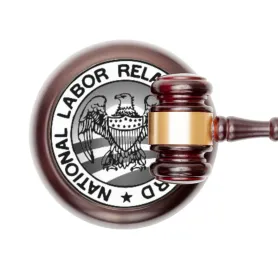National Labor Relations Board (NLRB) General Counsel (GC) Jennifer Abruzzo’s efforts to alter the labor and employment landscape continue. The GC’s latest controversial enforcement memorandum (GC Memo 23-08) asserts that certain non-compete provisions in employment contracts and severance agreements violate the National Labor Relations Act.
The GC previously issued controversial enforcement memoranda involving such issues as:
- Invalidating Confidentiality, Non-Disparagement Provisions in Severance Agreements;
- Employee’s Right to Refrain from Captive Audience and Other Mandatory Meetings; and
- Limiting Electronic Monitoring of Employees.
GC memos are not binding law. However, the memos outline theories that the GC will prosecute. Here, the GC seeks to pursue a new theory that non-compete agreements generally interfere with employee rights protected by Section 7 of the Act.
Highlights
GC Memo 23-08 states that, absent narrowly tailored provisions for “special circumstances,” the “proffer, maintenance, and enforcement” of non-compete agreements tend to infringe on employees’ Section 7 rights to engage in protected concerted activities under the Act and, therefore, they are unlawful. The GC declared that retaining employees or protecting special investment in training employees are unlikely to “ever justify” an overbroad non-compete provision.
GC Abruzzo’s memo contends that overbroad non-compete agreements violate the Act when employees could reasonably construe the provisions to “deny them the ability to quit or change jobs” by limiting access to other employment. The GC notes that these agreements can weaken employees’ leverage and bargaining power if provisions discourage organizing and other employee activism.
The GC asserts non-compete agreements infringe on the following protected activities:
- Concertedly threatening to resign to secure better working conditions;
- Carrying out concerted threats to resign or otherwise concertedly resign to secure improved working conditions;
- Concertedly seeking or accepting employment with a local competitor to obtain better working conditions;
- Soliciting their coworkers to go work for a local competitor as part of a broader course of protected concerted activity; and
- Seeking employment, at least in part, to specifically engage in protected activity, including union organizing, with other workers at an employer’s workplace.
The GC recognizes that non-compete provisions may be lawful if they “clearly restrict only individuals’ managerial or ownership interests in a competing business, or true independent-contractor relationships.” Likewise, non-compete agreements protecting employers’ proprietary information or trade secrets, the memo states, may be considered a legitimate business interest if supported by narrowly tailored provisions. The NLRB also will focus on the level of the worker and compensation paid to the employee at issue, the memo continues. Non-compete agreements between employers and low-to-middle wage workers who are not privy to trade secrets or other protected interests should be invalidated, according to the memo.
Implications
While the GC’s memo is not binding law, it is the latest in federal initiatives to restrict non-compete agreements nationwide. Indeed, the Federal Trade Commission (FTC) issued a Notice of Proposed Rulemaking in January 2023 to broadly ban the use of non-compete covenants throughout the country. The FTC, NLRB, and the Department of Justice’s Antitrust Division also have agreed to collaborate on enforcement of labor and antitrust laws.
All NLRB regional offices are required by the GC to submit cases concerning “arguably unlawful” non-compete agreements, as well as special circumstances defenses, to the NLRB Division of Advice. The memo directs NLRB regions to seek make-whole relief for employees subject to unlawful provisions who can show lost employment opportunities as a result of such provisions. Once complaints issue, the GC will seek to convince the members of the NLRB to adopt her theory that such provisions violate the Act.
Employers, whether unionized or not, should consult with experienced labor counsel to thoroughly assess non-compete and non-solicitation agreements and severance agreements in light of Section 7 and the GC’s memo.







 />i
/>i

